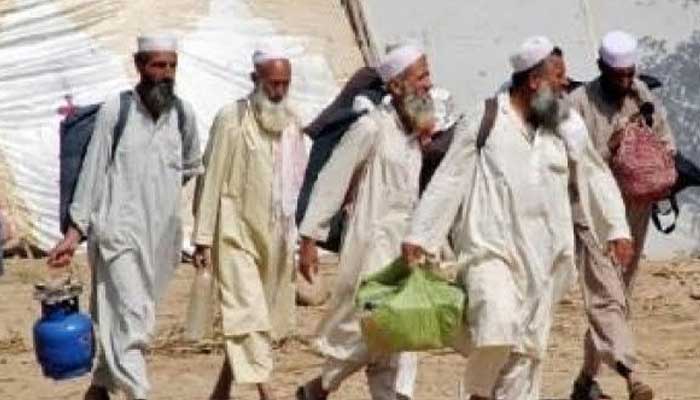Deobandi clerics meet to avoid Tablighi Jamaat’s crisis
The Tablighi Jamaat, which concentrates on individual piety, has split in recent years over leadership issue, especially in Bangladesh, India and the United Kingdom. The differences among the leaders turned into violent clashes during Bangaldesh’s Bishwa Ijtema in early December over establishing dominance, killing several members and injuring hundreds others.
As the annual three-day congregation of Tablighi Jamaat is set to start in Karachi’s Orangi Town on January 31, prominent Deobandi clerics from across the country gathered this week at the Jamia Daruluoom seminary to chalk out a strategy to save the Tablighi Jamaat from longstanding disputes that have split the apolitical and proselytising organisation in Bangladesh, India and United Kingdom.
The Tablighi Jamaat, which concentrates on individual piety, has split in recent years over leadership issue, especially in Bangladesh, India and the United Kingdom. The differences among the leaders turned into violent clashes during Bangaldesh’s Bishwa Ijtema in early December over establishing dominance, killing several members and injuring hundreds others.
Showing their concerns over the situation the Tablighi Jamaat facing in various countries and to save the organisation from such a situation in Pakistan, Mufti Rafi Usman, principal of the Jamia Darul Uloom seminary, convened a meeting to discuss the situation.
Jamia Darul Uloom Karachi’s Mufti Taqi Usmani, Darul Uloom Haqqani Nowshera’s Maulana Anwar ul Haq, Jamia tur Rasheed Karachi’s Mufti Abdul Rahim, Jamia Farooqi Karachi’s Maulana Dr Muhammad Adil, Jamai Binori Town’s Maulana Imadadullha, Jamia Binoria Karachi’s Maulana Noman Naeem and Darul Uloom Farooqia’s Maulana Qazi Abdul Rasheed were prominent among the clerics who attended the meeting.
The participants showed their concerns over the violent clashes in Tablighi Ijtima in Bangladesh and internal differences in India and agreed to send a joint well-wishing message from the religious scholars to the Jamaat’s four centres in Pakistan.
They also said that they would play their role to save the organsiation from such a situation and continue their support and patronage of the Tablighi Jamaat in Pakistan. They also said that the organisation’s Pakistan leaders should become impartial in the crisis and not issue any statement in favour of any faction outside the country.
In a separate statement, Mufti Muhammad Naeem, the principal of the Jamia Binoria, demanded of the Sindh government to provide security to the gathering that would start on January 31 in Orangi Town nieghbourhood.
Tens of thousands of people are expected to attend the three-day congregation that will end on February 3. Naeem also said that the provincial government should chalk out a plan for providing basic civic facilities, such as water and electricity, and transportation for the guests attending the congregation.
-
 ‘Stingy’ Harry, Meghan Markle Crack Open A Chasm Despite Donation: ‘Do So At Your Own Peril’
‘Stingy’ Harry, Meghan Markle Crack Open A Chasm Despite Donation: ‘Do So At Your Own Peril’ -
 Research Explores How TikTok’s Recommendation System May Influence Teen Beliefs
Research Explores How TikTok’s Recommendation System May Influence Teen Beliefs -
 Google Wins Approval To Export South Korea’s High-precision Maps After 20 Years—With Strict Conditions
Google Wins Approval To Export South Korea’s High-precision Maps After 20 Years—With Strict Conditions -
 King Charles’ Health Battle: What Has Been Revealed About His Cancer So Far
King Charles’ Health Battle: What Has Been Revealed About His Cancer So Far -
 Bad Bunny Tugs At People’s Heartstrings With A Generous Act Of Love: ‘Our Staff Didn't Even Realize’
Bad Bunny Tugs At People’s Heartstrings With A Generous Act Of Love: ‘Our Staff Didn't Even Realize’ -
 Paramount Wins Warner Bros. Bidding War As Netflix Abandons Deal: Here’s Why
Paramount Wins Warner Bros. Bidding War As Netflix Abandons Deal: Here’s Why -
 Cardi B Finally Responds To Accusations About Destroying 'SNL' Set After Nicki Minaj Joke
Cardi B Finally Responds To Accusations About Destroying 'SNL' Set After Nicki Minaj Joke -
 Gorton And Denton By-election Result: Green Party Defeats Labour In Blow To Keir Starmer
Gorton And Denton By-election Result: Green Party Defeats Labour In Blow To Keir Starmer -
 Jack Dorsey Cuts 4,000 Roles, Says AI Requires Smaller Teams
Jack Dorsey Cuts 4,000 Roles, Says AI Requires Smaller Teams -
 Reggie Bannister Health Takes ‘difficult Turn’ Amid Dementia, Parkinson’s Battle
Reggie Bannister Health Takes ‘difficult Turn’ Amid Dementia, Parkinson’s Battle -
 'Humble Traitor' Rob Rausch Makes Unexpected Move After Betraying Maura Higgins In Season 4
'Humble Traitor' Rob Rausch Makes Unexpected Move After Betraying Maura Higgins In Season 4 -
 Sarah Ferguson Drops An Accusation Against Andrew? ‘He Just Wants Leverage’
Sarah Ferguson Drops An Accusation Against Andrew? ‘He Just Wants Leverage’ -
 Anthropic Rejects Pentagon Military AI Proposal, Holds Firm On Safety Guardrails —What’s Next?
Anthropic Rejects Pentagon Military AI Proposal, Holds Firm On Safety Guardrails —What’s Next? -
 'Traitors' Reunion Drama: Rob Rausch Defends Strategy, Makes Shocking Revelation After Victory
'Traitors' Reunion Drama: Rob Rausch Defends Strategy, Makes Shocking Revelation After Victory -
 Inside Hillary Clinton’s Epstein Testimony: Key Takeaways And Highlights Explained
Inside Hillary Clinton’s Epstein Testimony: Key Takeaways And Highlights Explained -
 'Too Hard To Be Without’: Woman Testifies Against Instagram And YouTube
'Too Hard To Be Without’: Woman Testifies Against Instagram And YouTube




